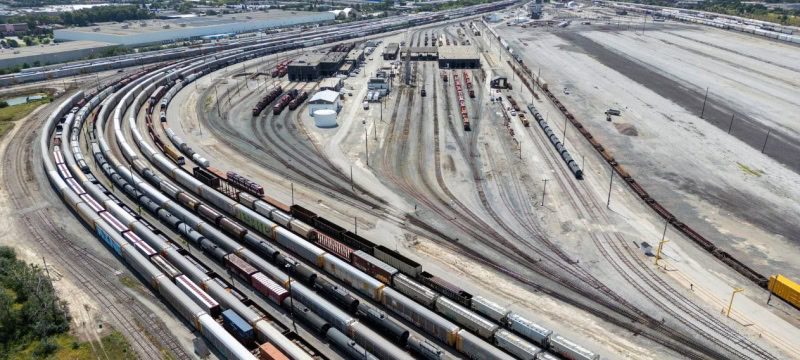Canada’s economy could lose billions of dollars this year if a rail stoppage that began on Thursday extends for several weeks, potentially increasing unemployment and driving up consumer prices, economists and analysts have warned.
However, the impact may be minimal if the stoppage lasts less than a week, they noted.
The shutdown was triggered when Canada’s two largest freight rail operators, Canadian National Railway and Canadian Pacific Kansas City, locked out workers from the Teamsters union after failing to reach labor agreements.
Read more: Oil Tanker Ablaze and Adrift in Red Sea Following Multiple Attacks
Pedro Antunes, chief economist at the Conference Board of Canada, warned that a prolonged stoppage could be catastrophic. He estimated that a two-week strike could reduce nominal GDP by $3 billion this year, and a four-week strike could lower GDP by nearly $10 billion in 2024, leading to 49,000 job losses.
The simultaneous shutdown of the majority of Canada’s rail freight is “growth-negative and inflation-positive,” said Robert Kavcic, senior economist at BMO Capital Markets. He predicted that the stoppage could reduce economic growth by about 0.1 percentage points each week, with the impact growing the longer it continues, translating to over $2 billion in weekly GDP losses.
Canada’s economic growth has been sluggish this year, hampered by near 23-year-high interest rates before the Bank of Canada began cutting rates in June.
After a second consecutive rate cut in July, Bank of Canada Governor Tiff Macklem signaled a shift in focus from curbing inflation to stimulating the economy.
First-quarter GDP growth was only 1.7%, well below the bank’s April forecast, prompting a downgrade in this year’s growth outlook from 1.5% to 1.2%.
Rising unemployment, which reached a 30-month high last month, along with about C$300 billion in upcoming mortgage renewals, will continue to strain the economy, economists say.
In this context, a prolonged rail stoppage could further stall economic momentum, they warned.
Derek Holt, head of capital markets economics at Scotiabank, stated that a one- to three-week strike could drag monthly GDP down by 0.1%-0.2%, with the impact intensifying exponentially if the strike extends beyond three weeks.
As the world’s second-largest country by area, Canada heavily relies on CN and CPKC to transport grain, fertilizers, other commodities, and manufactured goods like chemicals and automobiles. The total annual rail freight cargo in Canada exceeds C$380 billion, most of which is moved on CN and CPKC’s networks.
Randall Bartlett, senior director of Canadian economics at Desjardins, noted that past rail stoppages have typically lasted no longer than a week or ten days. He cautioned that while a short-lived stoppage might have minimal impact, an extended strike could cause significant economic harm.









